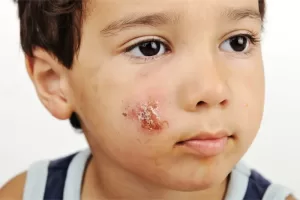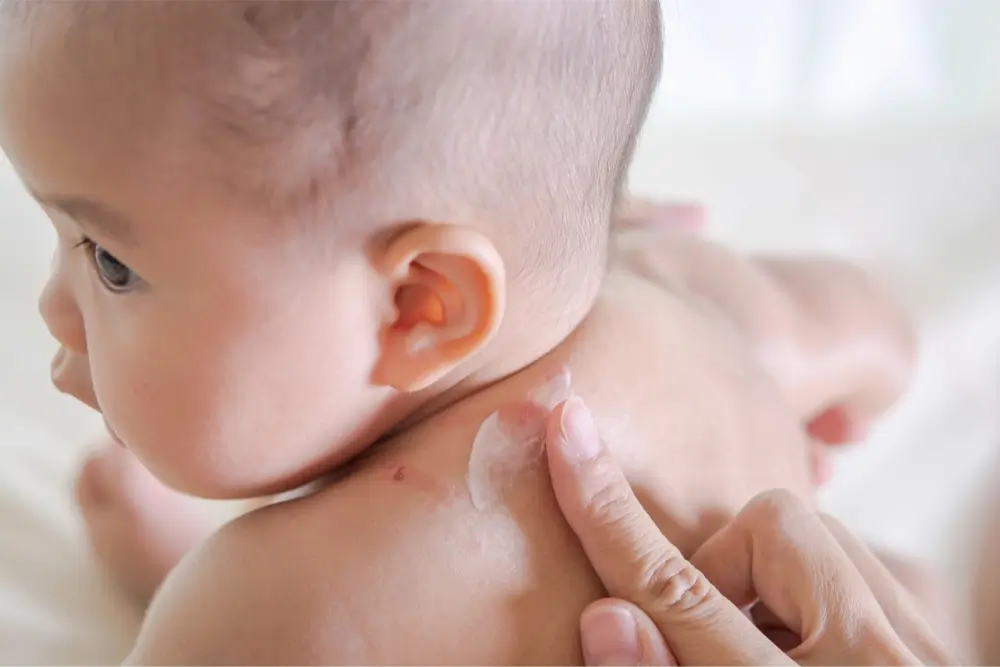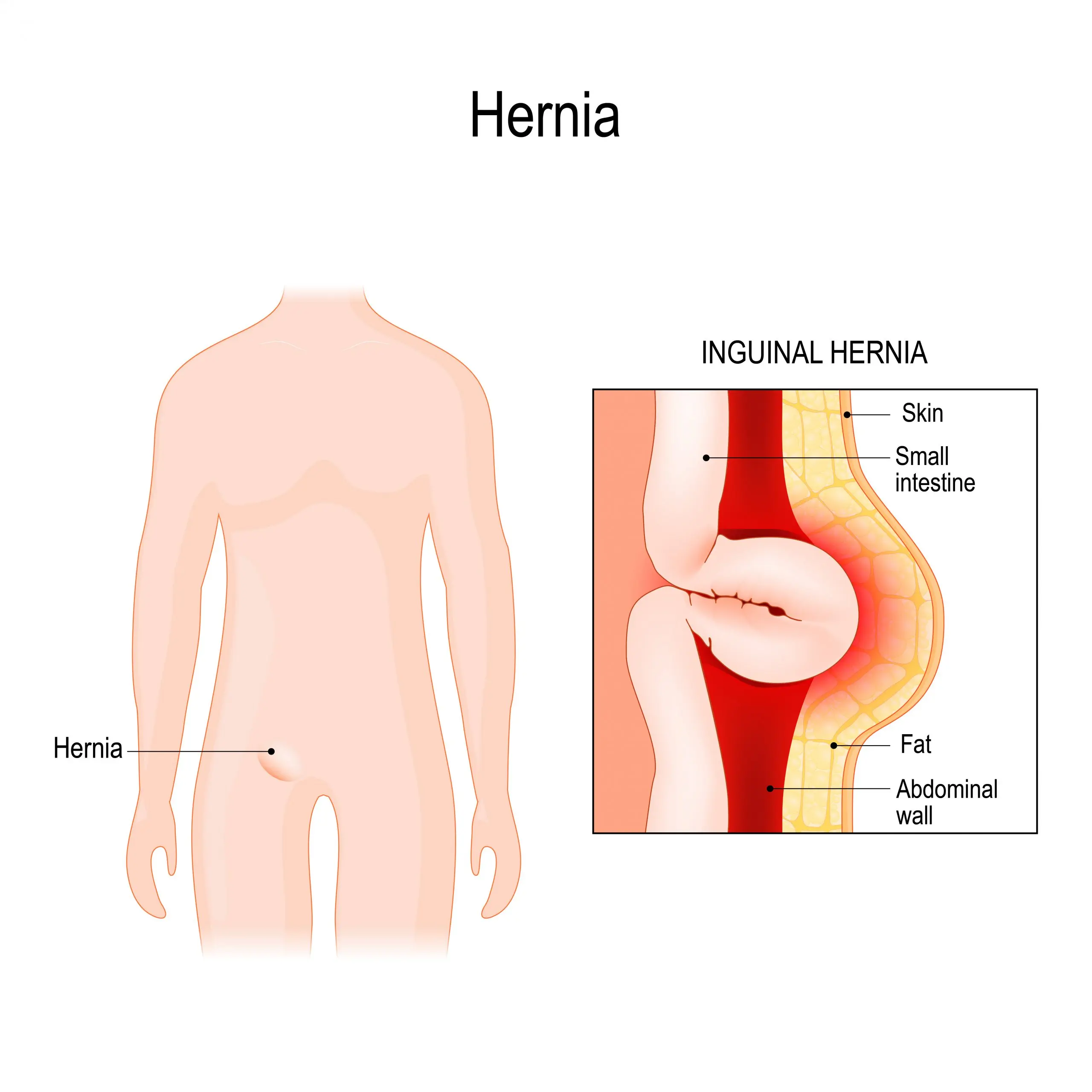What are School Sores and how are they treated?
Medically Reviewed by Dr Davinder Nagah
Last updated on 11.06.2024
What are school sores (impetigo)?
- School sores, also referred to as Impetigo, is a bacterial skin infection which leads to spots or lesions on the skin. These sores may appear as blisters that then burst and weep, before developing a crust. They are often itchy.
- The condition is caused by bacteria called staphylococcus (known as “staph” for short) or streptococcus (known as “strep” for short)
- It commonly affects children of school age.
What are the symptoms of school sores (impetigo)?
Impetigo typically appears as red sores or blisters that can occur anywhere on the body but are most commonly found around the nose and mouth, or the limbs. These sores may be itchy but are generally not painful. Initially, the sores start as red spots that quickly develop into blisters. These blisters can burst, leaving a wet area that forms a yellow-brown crust. There are two main types of impetigo: non-bullous and bullous. Non-bullous impetigo, there are honey-colored crusts over red sores, while with bullous impetigo there are larger blisters that can leave a scaly rim after bursting.
How do you get school sores (impetigo) ? Are school sores contagious?
- School sores are very contagious.
- They spread from one person to another by direct skin contact, by touching an object or surface which the infected person has touched, or from shared towels or clothing.
- School sores can appear on previously normal skin, but if there’s been damage to the skin (e.g. from a scratch, cut, insect bite, eczema or an infection like chicken pox) it can make it easier for it to take hold.
- If a child scratches the sores, they may spread it to nearby skin or other parts of their body.
- School sores are not a sign of bad hygiene.
How are school sores diagnosed?
- If you think your child has school sores (impetigo), you should see your doctor
- They’ll usually be able tell what it is, simply by looking at the rash
- Sometimes a skin swab may be taken, if the diagnosis is uncertain.
What is the treatment for school sores (impetigo)?
- your doctor will usually prescribe a topical antibiotic cream to apply until the impetigo rash is gone
- The cream may work better if the crusts on the lesions are softened and removed before applying it. This can be done by giving the child a warm bath and gently bathing the lesions with either a disposable cloth, or one that can be washed at a high temperature afterwards.
- doctors may suggest using bleach baths to remove crusts- this might sound “extreme” but it’s just a way of adding a small amount of disinfectant to bath water, thereby reducing the bacterial count on the child’s skin. It’s also used as a treatment for infected eczema. Instructions for safely making a bleach bath can be found on the Royal Childrens Hospital website.
- if the rash is very widespread or more severe, oral antibiotics may be advised by your doctor- it is very important to finish the full course of antibiotics, to ensure the infection does not come back.
- if a child repeatedly gets school sores, it may mean they’re carrying it on their body, often in the nose. Your doctor may take swabs and prescribe a course of nasal antibiotic cream.
- If a child is scratching at sores, you may need to apply a waterproof dressing
- It’s important to reduce spread to other children by keeping your child at home from school or childcare for 24 hours after treatment has been started.
- Hygiene measures like regular hand-washing are important. Clothing, bedding and towels used by the child should ideally be cleaned separately, in a hot wash and tumble dried. Where possible, toys should also be cleaned.
How do you prevent school sores from spreading?
Preventing the spread of impetigo involves strict hygiene measures. Children with impetigo should be kept home from school or daycare until they have been on antibiotics for at least 24 hours and the sores are no longer weeping. Key preventive measures include:
- Hand Hygiene: Regular hand washing with soap and water is essential for everyone in the household.
- Personal Items: Avoid sharing personal items such as towels, clothing, and bed linens.
- Cleaning and Covering Wounds: Keep any cuts, abrasions, or insect bites clean and covered.
- Nail Hygiene: Keep fingernails short and clean to prevent bacteria from spreading through scratching.
- Linen Care: Wash the infected person’s clothes, towels, and bed linens separately in hot water, and dry them in the sun or a hot dryer.
Complications
While impetigo is generally a mild infection, it can lead to complications if not properly treated. These complications include cellulitis, an infection of the deeper layers of the skin, and post-streptococcal glomerulonephritis, a rare kidney condition. Other serious complications, although rare, include sepsis and rheumatic fever.
How soon can my child return to childcare or school?
Your child can go back to child care or school after they’ve had 24 hours of treatment, and once the sores are completely covered by dressings. It is important to complete the course of treatment fully, otherwise the infection may come back.
Can school sores cause scarring?
- Generally not, though if a child scratches the lesions badly, a scar could form
- If scratching of impetigo is a problem, cut the child’s fingernails and apply a new waterproof dressing to the troublesome lesions each day, after applying the treatment.
Are school sores serious?
- Though school sores can look quite unpleasant, the child will feel usually feel well
- However, sometimes the bacterial infection can spread through the body- you should see a doctor if your child also develops fevers, seems generally unwell or if the rash becomes very inflamed and widespread.
Further Patient Resources:
Royal Children’s Hospital school sores fact sheet: Impetigo (school sores). rch.org.au
School sores (impetigo) – including symptoms, treatment and prevention. sahealth.sa.gov.au
Article Resources:
Topical Antibiotics for Impetigo. A review of the clinical effectiveness and guidelines.
Food allergies in Australian children- what you need to know
Food allergies in Australian children- what you need to know Food allergies are on the rise in Australia, affecting 5-10% of children. Understanding allergies, recognising the symptoms, and knowing [...]
Inguinal hernia
Inguinal hernia A hernia is a bulge or protrusion through a weakness or an opening. An inguinal hernia is one that occurs in the groin where the abdomen meets [...]
Phimosis – tight foreskin
What is Phimosis? What is Phimosis? Phimosis is the medical word that describes a tight foreskin that cannot be pulled back past the head of the penis (glans). This [...]






